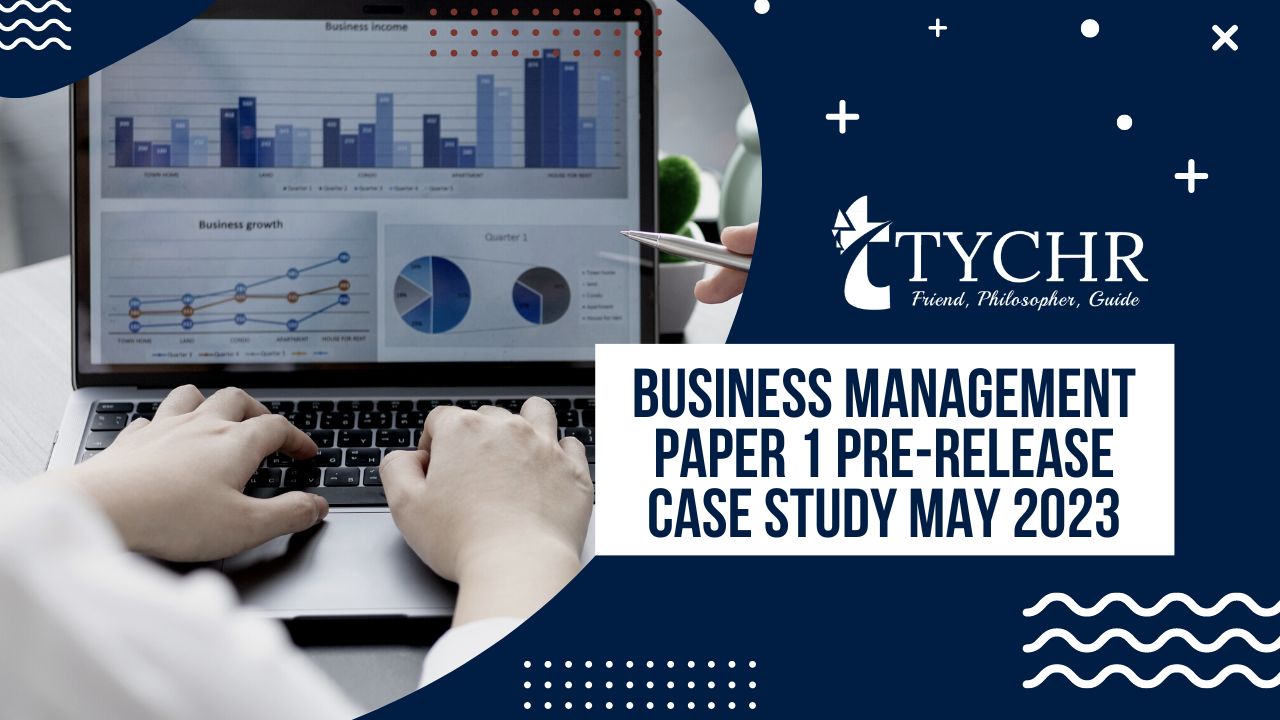Table of Contents
- 1 Aim and Overview of Paper 1 assessment
- 2 Paper 1
- 3 How To Prepare?
- 4 Here we have prepared Notes for IB Case Study MAY 2023
- 5 Frequently Asked Questions (FAQs)
- 5.1 Q1: What is IB Business Management Paper 1?
- 5.2 Q2: What topics are covered in IB Business Management Paper 1?
- 5.3 Q3: How is IB Business Management Paper 1 structured?
- 5.4 Q4: What are the key skills required to excel in IB Business Management Paper 1?
- 5.5 Q5: How can I prepare for IB Business Management Paper 1?
Aim and Overview of Paper 1 assessment
- Paper 1 promotes a holistic approach to IB Business Management
- It assess all five units of the IB BM Syllabus
- Section C: Extended Response Question (Essay) – HL only
- It requires students to inculcate analytical and critical thinking skills.
Each exam session, the IB releases a pre-issued case study for the external examinations.
- For the May examination, it is released in the month of February.
- For the November examination, it is released in the month of August.
The case study is based on a hypothetical organisation, which covers all 5 units in the syllabus. It acts as a useful stimulus for students when revising for both Paper 1 and Paper 2.
Paper 1
| Standard Level | Higher Level |
| Section A: Answer 2 of 3 structured questions, 10 marks per question | Section A: Answer 2 of 3 structured questions, 10 marks per question |
| Section B: Additional unseen material. Answer the compulsory structured question worth 20 marks | Section B: Additional unseen material. Answer the compulsory structured question worth 20 marks |
| Section C – Additional unseen material. Answer the compulsory question worth 20 marks. HL extension topics will be assessed | |
| Weightage – 30% | Weightage – 35% |
| Total – 40 Marks | Total – 60 Marks |
| Duration – 1 hour 15 mins | Duration – 2 hour 15 mins |
How To Prepare?
A couple of months before the IB Business Management Paper 1, you will be given a pre-released case study. I hope this blog will help you get an idea about how you can fully utilise all the time given to you to prepare!
- Read It – You need to know the case study inside out. You should spend so much time reading it several times so that you almost memorise it.
- Make Notes – Each time you read the case study make notes. Firstly, start with summarising each paragraph and then each section. Then make a timeline to see the progression of the business and important dates. Then List all the stakeholders involved and how they impacted the organisation. Moreover, try to split the case study in the five units. Generally, the case study will cover all the topics. Make a list of advantages and disadvantages. Lastly, Use BM techniques like SWOT, STEEPLE, Ansoff Matrix.
- Think of Possible Questions and then answer them.
Here we have prepared Notes for IB Case Study MAY 2023
Skandvig Terra PLC
Vision Statement: Making the world a safer place
Producing and delivering potable water in Norway
In 1980, SVT expanded into other business sectors:
- Desalination: Remove mineral components from water
- Household water treatment products
Now, Builds and operates water treatment plants to purify the water.
One director in each division with authority for quick decision making
SVT pays travel expense, accommodation costs and salary
Works with charities and NGOs
Stakeholders
- External – Customers
- External – People affected by CSR
- External – Government Entities (ministry of water and irrigation, and others …)
- External – Competitors/ Rival Businesses
- Internal – Employees at SVT
- Internal – Shareholders of SVT
- Internal – Directors of SVT (Yannick, Ariadne)
Several Divisions such as
Fresh Water Division
- Sources, treats, stores and transports water from environment to distribution to population.
- Director – Yannick Pedersen (Situational Leadership Style)
- Water is collected and stored in large manufactured reservoirs
- Subterranean Aquifers – Underground layers of rock are saturated with water.
- Surface Water – Streams, rivers, lakes, reservoirs and wetlands
- Recent Acquisition of Geng PLC (water supplier in UK)
- Internal and External Growth
- Supplies Potable Water to 200 million around the world
Desalination Division (Constructs and Operates Desalination Plants)
- Process that removes salts and mineral from sea water to produce water
- 15% of the world’s desalination capacity
- Market for desalination growing quickly
- Global market for desalination will double in the next 20 years
- Two income streams
Operates desalination in 19 countries such as Australia, China, Greece, India, Japan.
Manufacturers and operates desalination plants
Engineering Division
- Manufacturer Water Treatment equipment and Power Turbines
- Ariadne Johansen Director (Autocratic Leadership Style)
- In 2015, Takeover of H4 PLC, a rival engineering company \
- Factories in Germany, UK
- Consumer Products Division
-
- Manufacturers and sells Water Filters for use at home
- The filters take potable water and use carbon to remove calcium, chlorine, copper, cadmium and zinc
- SVT’s share price rise by 65%
- Increase dividends each year
- SVT’s annual profit doubled
- Aims to become the brand leader in the water filter industry
Important Topics
- Leadership Styles (Situational vs. Autocratic)
- Financial versus non-financial motivation
- Charities and non-governmental organisations (NGOs)
- Pricing strategies
- Corporate social responsibility (and sustainability)

Key Terms
After reading the Skandvig Terra PLC case study, students should define the following terms, written in the context of the case study.
- Autocratic
- Board of Directors
- Decision Making
- Director
- Economies of Scale
- Entrepreneurs
- Induction Training
- Leadership Style
- Market Share
- Motivation
- External Environment
- Vision Statement
- Takeover
- Stakeholders
- Secondary Market Research
- Non-Governmental Organisations (NGOs)
- Product Range
- Pricing Strategy
- Recruitment
- Productivity per employee
Sample Questions
Unit 1 – Business Organization and Environment
- State two features of a family-owned business as a form of business ownership
- Explain two advantages and one disadvantage for SVT to be a Public Limited Company.
- Explain the importance of corporate social responsibility (CSR) for SVT.
- Using the case study, explain two strengths and one weakness of SVT.
- Explain two possible reasons for SVT’s decision to take over H4 PLC in 2015.
Unit 2 – Human Resource Management
- Describe one advantage and one disadvantage of high staff turnover resulting from SVT’s modernization programme for H4 PLC.
- Outline two possible sources of conflict between Ariadne and Yannick.
- Using appropriate motivational theory, explain the factors that affect the level of motivation at SVT.
- With reference to SVT, describe two functions of the human resources department.
- Explain two financial and one non-financial methods that H4 PLC could have used to keep its employees motivated.
Unit 3 – Finance and accounts
- Describe two suitable sources of finance for SVT’s WF15 project in LEDCs.
- Outline how SVT benefits from a fall in its unit costs.
- Explain the importance of the substantial marketing budget that the directors have approved for the Consumer Products Division
- In the context of SVT’s Consumer Products Division, distinguish between revenue and capital expenditure.
Unit 4 – Marketing
- Explain how sales forecasting calculations can help SVT’s Desalination Division to benefit from the growing opportunity in the demand for cruise holidays.
- Describe the value of SVT using secondary market research.
- Describe the significance of first hand data collected by Jayne Dees in Sudan.
- Outline two advantages for SVT’s Consumer Products Division being a brand leader.
- Explain two benefits and one disadvantage for SVT having regional monopoly power in the countries in which it operates.
Unit 5 – Operations management
- Describe the importance of ecological sustainability for SVT’s operations.
- Describe the importance of social sustainability for SVT’s operations.
- Describe the importance of economic sustainability for SVT’s operations.
- Outlining how meeting quality standards set by institutions such as the World Health Organization is important for SVT’s launch of the WF15 water purifier.
- Water contamination is an ever-present threat to SVT. Describe one advantage and one disadvantage for SVT’s Fresh Water Division having a contingency plan.
Additional Resources
SWOT Analysis
Frequently Asked Questions (FAQs)
Q1: What is IB Business Management Paper 1?
A: IB Business Management Paper 1 is an exam paper that is part of the International Baccalaureate (IB) Business Management course. This exam paper is focused on testing students’ knowledge and understanding of various topics related to business management.
Q2: What topics are covered in IB Business Management Paper 1?
A: IB Business Management Paper 1 covers a range of topics related to business management, including business organization and environment, human resource management, finance and accounts, marketing, operations management, and strategic management.
Q3: How is IB Business Management Paper 1 structured?
A: IB Business Management Paper 1 is a two-hour exam paper that consists of three sections. Section A contains multiple-choice questions, section B contains short-answer questions, and section C contains an extended response question.
Q4: What are the key skills required to excel in IB Business Management Paper 1?
A: To excel in IB Business Management Paper 1, students need to demonstrate strong analytical and critical thinking skills. They also need to be able to apply their knowledge of business management concepts to real-world scenarios, and effectively communicate their ideas in a clear and concise manner.
Q5: How can I prepare for IB Business Management Paper 1?
A: To prepare for IB Business Management Paper 1, students should focus on developing a strong understanding of the key concepts and topics covered in the course. This can be achieved through reading textbooks and other resources, participating in class discussions, and completing practice exams and assignments. It can also be helpful to work with a tutor or study group to reinforce your understanding of the material and prepare for the exam.







